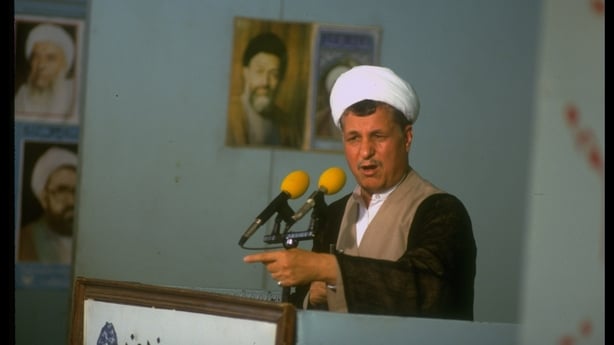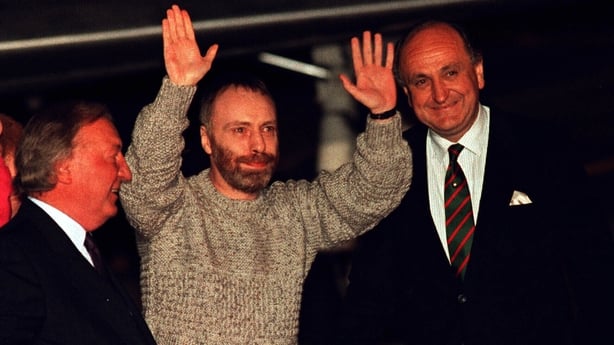Ireland was offered a "secret meeting" with the Iranian president to help in the release of Belfast man Brian Keenan who was taken hostage and held for four years by militia in Lebanon.
The previously unknown offer, made by Iran's ambassador to Ireland to a government minister during a meeting at Leinster House, is documented in Department of Foreign Affairs files published as part of the annual National Archives of Ireland release.
Mr Keenan was abducted from outside his apartment in Beirut on 11 April 1986 while teaching English at the US embassy in Lebanon and was held along with a number of other western hostages until 24 August 1990.
While no organisation claimed responsibility or made any demands at the time, the incident came during a period of heightened tensions between the US, EU and Iran due to the oil crisis, violence in the Middle East, a fatwa against author Salman Rushdie and a freezing of Iranian assets in western countries.

Extensive efforts by the Irish government were made to secure the release of Mr Keenan, but little progress was made until the final months of his incarceration when officials finally received confirmation that he was still alive.
Among the most dramatic diplomatic moments was a meeting at Leinster House on 8 March 1990, between the then-Iranian ambassador to Ireland Bahram Ghassemi and minister of state at the Department of Foreign Affairs Seán Calleary.
Mr Calleary raised Keenan’s plight, though he accepted that he was being held in a different country and that Iran had no direct contact.
At this point, the ambassador asked the officials to stop taking notes, to treat what he had to say as "very confidential" and not to give it any publicity.
Read more:
Netanyahu lobbied for Dublin embassy, State Papers show
SF, govt had 'sharp exchange' over criminality comments
Weapon manufacture proposals rejected by separate govts
Gerry Adams pushed for US visa to allow fundraising
State Papers: Six more things we learned
He then suggested that if the Irish had a secret meeting with Iranian president Akbar Hashemi Rafsanjani and asked about Mr Keenan, "then the problem could be solved very quickly".
The following month, the assistant secretary to the Department of Foreign Affairs, Patrick O’Connor, noted another meeting with the Iranian ambassador in which he confirmed "the importance of Keenan's Irishness in Iran's efforts to secure his release", saying that as "Ireland has no problems with the Middle East" Iranian officials could speak to someone to explain "the taking hostage of Brian Keenan was a mistake".
The ambassador added that "the less said about British efforts for Brian Keenan the better".
On 1 May 1990, minister for foreign affairs Gerry Collins was told by officials that it "has now been confirmed explicitly that he [Mr Keenan] is alive" due to interviews with hostages from the US and France who had been released.

On a visit to Damascus in July 1990, Irish diplomat Declan Connolly was in contact with the Syrian defence minister Mustafa Tlass who told him that "the Israelis had deliberately prevented a hostage release and that their action had been aimed specifically against Ireland. He implied that Mr Keenan had been virtually within their grasp but that their efforts would continue and that they would succeed".
Mr Tlass added that he looked forward to Brian Keenan’s release, so that Syria "could rub Mrs Thatcher's face in the dirt".
Mr Connolly expressed some doubt about all this, as the minister "has an enormous reputation for outspoken and exaggerated comment".
Mr Keenan was finally released on 24 August 1990, with the government thanking the government of Iran for the efforts they had made for his release.
The newly released files also detail a number of hoax offers to secure Mr Keenan’s release, including one in May 1989, when "the consulate in Beirut was approached by an unknown Lebanese who demanded a ransom of $4m for Mr Keenan's release".
At the department’s request, Ireland’s honorary consul in Beirut met the individual making the demand and asked him to produce evidence that he was genuine.
"He gave the caller a Bord Bainne sticker and asked him to return with a photograph of Mr Keenan holding the sticker. The party in question did not return."
[Based on documents in 2024/52/90 and 2024/52/145]

